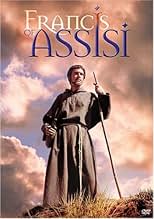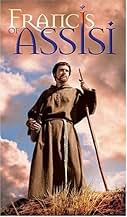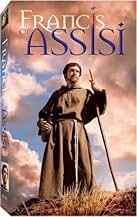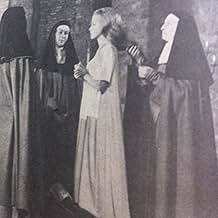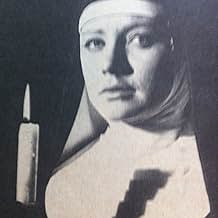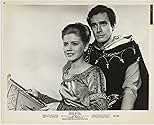Ajouter une intrigue dans votre langueIn 13th century Italy, Francis Bernardone, the son of an Assisi merchant, renounces a promising army career in favor of a monastic life and starts his own religious order, sanctioned by the ... Tout lireIn 13th century Italy, Francis Bernardone, the son of an Assisi merchant, renounces a promising army career in favor of a monastic life and starts his own religious order, sanctioned by the Pope.In 13th century Italy, Francis Bernardone, the son of an Assisi merchant, renounces a promising army career in favor of a monastic life and starts his own religious order, sanctioned by the Pope.
- Réalisation
- Scénario
- Casting principal
- Lucia, Tavern Girl
- (non crédité)
- Friar
- (non crédité)
Avis à la une
And it's not bad at all. The first half-hour or so, unfortunately, is not good. It looks tacky and cheap, like a '60s TV-movie. There's a ludicrous battle scene early on, but this marks the point after which the film starts to get better. The Italian locations are beautiful. The film is overly reverential and was made for a general audience fifty years ago, so we don't really get to see how much of a party animal Francis was before his conversion. Bradford Dillman pulls off the near-impossible job of making this plaster saint interesting. The incredibly lovely Dolores Hart plays Clare, the noblewoman who becomes the first Franciscan nun (and Dolores actually did enter the convent the year after this film, and is still there today, and remains as lovely as ever). There is a subtlety in the relationship between Francis and Clare that often works, but occasionally you get the feeling that the two are behaving in such a restrained way that they might actually be 13th-century Vulcans. Of course, the director here, Michael Curtiz, is responsible for the most romantic movie of all time, Casablanca. Whatever is there between Francis and Clare is left subtle enough for us to appreciate while not peeving the more conservative members of the audience. Stuart Whitman, the nobleman who loves Clare and serves as the third member of this non-triangle, seems miscast here. Stu was never really the nobleman type.
Interestingly, the film takes a dim view of the Crusades, as it shows Christian forces raping and pillaging their way to the Holy Land. There's a scene with Francis meeting the leader of the enemy Saracens that shows their Sultan in a much more civilized light. The film also states that Francis felt his mission from God was to save the Church from its own materialism and heresy, pretty much along the lines of what Martin Luther would try to do two and a half centuries later. I'm not sure the nuns of 1961 really understood what was going on here.
My non-Catholic wife says that Francis has always been well thought of outside the Catholic religion, mainly because he loved animals and is generally felt to have been kind and modest. Not too many reputations have survived eight centuries of questioning and doubt intact. I really didn't expect to like this film, or to get all the way through it, but I was happily surprised to find that I rather enjoyed it.
Setting that aside (and even Protestants admire Francis, so I have no major criticism) what I most enjoyed here was the continual reflection in the movie on the state of the church and the Christian faith and Christians; the constant temptation (to which we all give in) to compromise the standards of Christ in favour of the standards of the world. The movie continually comes back to that theme; one could even say it revolves around it, as the primary battle Francis fights is to keep his order true to his "rule" - which was essentially the teachings of Christ that His own followers should renounce worldly possessions. Considering the repeated inability of Christians and the church to truly live up to the standards of Christ, the most meaningful words here were probably put on Francis' lips (although I'm unclear whether he actually spoke them): "if men were more perfect, we would need less compassion." So true.
This is at times interesting - but it's still significantly weakened in my view by its veneration of Francis rather than its objective portrayal of his life.
Stuart Whitman is perfect as always, he is always an interesting ornament to any film he acts in, while Bradford Dillman makes more of a type than a character. Old Finlay Currie is excellent as the pope, and so is Dolores Hart as Sister Clare, but none of these can match any of the Italian actors in the Italian films, since this film completely misses the Italian mentality and is all Hollywood. This was Michael Curtiz' last film but one, (his last became "Comancheros", better although more muddled,) and his professionalism gives standard polish to the whole film, but it hardly becomes more than a filmed legend, like glossy sugared saintly illustrations spiced with typical Hollywood sentimentality on top of it. Sorry, the true St. Francis is nowhere to be found in this film.
The only convincing character of some Franciscan credibility is brother Juniper played by Mervyn Johns. He has understood something of the Franciscan mentality, while all the rest is Hollywood, not at its worst but definitely at its most conventional.
However, all of this effort does not cover up problems. Many biographies of Francis are captivating, but the story, as presented here, is quite unbelievable and never involving. After Francis' conversion we see him pulling a cart through the streets asking for stones to rebuild a church (it just so happens that everyone along the way happens to have a few spare stones readily available). With a few followers we see Francis working with some crude structures at the church site and then, magically, we see Francis and his followers in an elaborate cathedral with large pillars and intricate stone work that would have taken sophisticated engineering to build. And Francis never encounters anything but beautiful sunny days.
Francis goes on a mission to the Holy Land and we see him wandering alone in the desert with a small pouch of water. Two Arabs are seen in this arid place who unleash vicious leopards upon Francis, but he tames them and gives them water. There is a "my God is bigger than your God" scene between Francis and the sultan that is quite depressing - how little progress we have make in 800 years.
Bradford Dillman does his best with the script he is given and has a couple of good scenes toward the end, but the acting by Dolores Hart and Stuart Whitman is pretty amateurish.
The main problem I have with this movie is that it did not show me what it was about this man that accounted for his accomplishments. He must have been inspiring and charismatic, but what we get here is a very passive reader of scripture. I understand the appeal of a Martin Luther King, but I do not understand the appeal of St. Francis from what I see in this movie.
The most enjoyable part of the movie for me were the photos of the Frescoes of Giotto in the Basilica of St. Francis of Assisi that played under the opening credits.
Le saviez-vous
- AnecdotesIn the film, Dolores Hart plays an aristocratic woman who becomes a nun. In reality, Hart left Hollywood to become a nun in 1963. She remains an active member of the Academy of Motion Picture Arts and Sciences, and is the only nun who votes for the Oscars.
- GaffesSeveral times in the movie, you can see the Basilica of Saint Francis in the background. It wasn't built before 1230, four year after Saint Francis' death.
- Citations
Francis Bernardone of Assisi: This could be so, a voice told me to rebuild the Lord's house. I thought I had to work with stone and mortar, but perhaps I was wrong.
- Crédits fous[Right before the closing title card] Pax et Bonum ("peace and all good [be with you]"). This Latin phrase is the traditional greeting and goodbye of the Franciscans, and it was established by Francis himself.
- ConnexionsReferenced in Laverne et Shirley: The Road to Burbank (1981)
Meilleurs choix
- How long is Francis of Assisi?Alimenté par Alexa
Détails
Box-office
- Budget
- 2 015 000 $US (estimé)
- Durée
- 1h 45min(105 min)
- Couleur
- Rapport de forme
- 2.35 : 1





